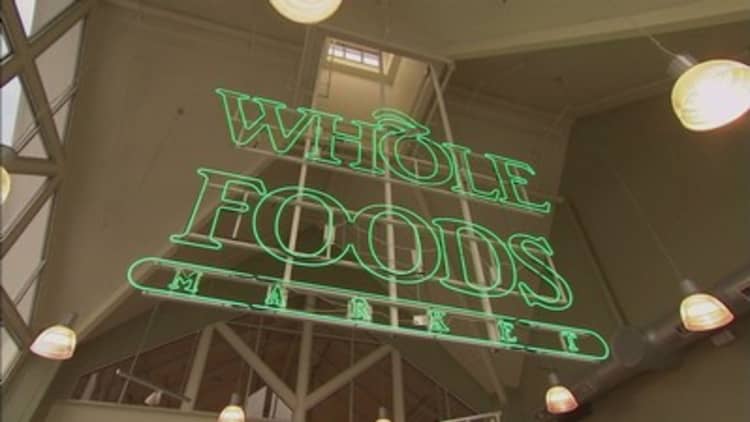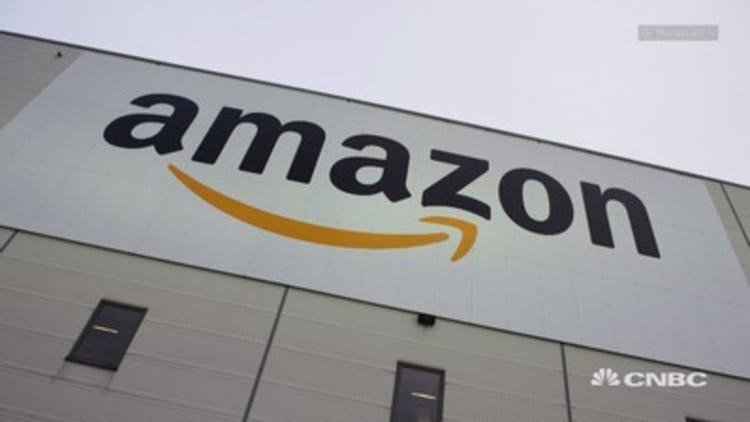A small footnote in Amazon's annual report shows the kind of financial commitment the company is making to the grocery business, beyond the $13 billion it spent last year on Whole Foods.
Amazon's "unconditional purchase obligations," a required disclosure for future payment agreements, ballooned to $24.2 billion in 2017, according to its 10-K filing last month. Amazon had just $1.6 billion of such obligations prior to the Whole Foods deal, and never had more than $2 billion in company history.
After acquiring Whole Foods, Amazon took on an additional $22 billion in contractually obligated future purchases. The balance, which also showed up in Whole Foods' filings for the first time in November, is almost entirely tied to the grocery chain's prior contract with its largest supplier United Natural Foods (UNFI), based on CNBC estimates and prior filings.
Big multi-year supplier contracts are rare for the e-commerce giant, which is known for signing short-term agreements that put constant pricing pressure on its suppliers. The grocery business is new territory for Amazon, and the disclosure reflects its long-term plan to turn Whole Foods into a major revenue driver.
"It is definitely a clear signal of Amazon's commitment and confidence to make the Whole Foods deal work," said Patrick Badolato, an accounting professor at the University of Texas who has followed Amazon for years in his class. "There's a huge commitment to keeping many of the core Whole Foods products there."

UNFI is a supplier of fresh produce as well as products ranging from Vita Coco coconut water and Horizon Organic milk to Kettle potato chips and Clif bars. The company reports quarterly results on Thursday and investors will be paying close attention to any discussion around margin pressure and what it's like to deal with Amazon, considering that about one-third of UNFI's revenue comes from Whole Foods.
Badolato said Amazon's disclosure is particularly significant because it extends until 2025. Most big-box retailers don't commit to such specific, multi-year purchasing agreements, he said. For example, almost all of Costco's future purchase obligations are accounted for this year, while fewer than half of Kroger's obligations go beyond its current fiscal year.
"It's meaningfully different," Badolato said. "Amazon is going full throttle into the grocery industry."
'Happily married couple'
Prior to the Amazon acquisition, Whole Foods had never reported the financial details of its agreement with UNFI. It's not clear why Amazon made the disclosure, but accounting experts told CNBC that it provides a firmer commitment than what had existed. Whole Foods said in its filing that the new purchase agreement disclosure arose from "the change in control."
Whole Foods and UNFI have deeply interwoven operations because of their 18-year relationship. In 2015, they disclosed an agreement that expires in 2025. That contract was likely based on more flexible terms and didn't require specific future obligations, said Kwang Lee, a former academic fellow at the U.S. Securities and Exchange Commission who now teaches accounting at the Korea Advanced Institute of Science and Technology.
"My gut feeling is that Whole Foods and UNFI are like a couple who have been happily married for years so a lot of their transactions were based on loosely defined terms," Lee said.
Terrence Blackburne, an accounting professor at the University of Washington, said it's "highly unlikely" Amazon was required to fully oblige to the existing supplier contracts after the acquisition. But the change in control, he said, may have caused UNFI to ask Whole Foods and Amazon to enter into a stricter contract.
UNFI investors were initially skeptical. On the day the Amazon deal was announced, UNFI's stock dropped over 10 percent on concern that its relationship with Whole Foods might change. After UNFI CEO Steve Spinner announced a commitment to "very specific minimum purchase obligations" in September — without specific financial details — the stock price started to rally. In December, UNFI raised its revenue guidance because of an "unexpected increase" in demand.
Whole Foods may very well be the driver. In November, the company posted its fastest sales growth in two years. The quarter included one month under Amazon's ownership.
Representatives from Amazon, Whole Foods, and UNFI were not immediately available for comment.
Joe Hansen, a consultant from BuyBox Experts, which works with Amazon suppliers, called the length of Amazon's contract with UNFI unprecedented.
Access to health and personal care
He pointed to another benefit to Amazon maintaining a close relationship with UNFI: access to health and personal care products.
Through its Select Nutrition subsidiary, UNFI says it sells "more than 14,000 health and beauty aids, vitamins, minerals and supplements." Hansen speculates that Amazon is trying to get better access to those types of products and expand the rapidly growing health and personal care category.
According to One Click Retail, Amazon's health and wellness sales grew 30 percent last year, bringing the total segment to $2.5 billion.
"It shows a very strong commitment to its health and personal care category," Hansen said. "It's Amazon's way of getting direct access to brands."
WATCH: Amazon giving Visa rewards cardholders 5% back when shopping at Whole Foods



